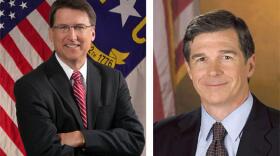In North Carolina, liberal groups have outspent conservatives on television, and Roy Cooper has outraised Pat McCrory, according to the most recent campaign finance reports available.
Cooper had raised 47 percent more money from 76 percent more contributions than McCrory through June 30, the most recent date for which campaign finance information is available.
Tracking television ads shows a similar trend. Cooper and liberal groups have bought more than 24,000 television ads at an estimated cost of more than $13 million, while McCrory and conservative groups bought less than 16,000 ads at a cost of $7 million, according to The Center for Public Integrity, which closely tracks political spending throughout the country.
With early voting beginning Thursday and North Carolina considered by nearly all political analysts to be a swing state, expect those political advertisements only to ramp up, with negative advertising taking the lion’s share of the airwaves. Campaign finance reports for the third quarter are not due with the N.C. Board of Elections until Oct. 31.

In the statewide election for Attorney General, Democrat Josh Stein showed a similar financial advantage over Republican Buck Newton. Through June 30, Stein had raised $2.2 million from nearly 2,000 contributions. Newton had raised $705,000 from 481 contributions.
Down the ticket, however, tells a different story. In races for the state legislature, Republicans have far outraised and outspent their Democratic rivals setting up the possibility of a state with a Democrat in the executive mansion, but a General Assembly ruled by Republicans. How Democrats fare in a few key races will go a long way toward determining if they can wrestle a veto-proof majority away from Republicans.
For example, Phil Berger, a ranking Senate Republican, had raised nearly $1.6 million through June 30, even though he is running uncontested. Similarly, House Speaker Tim Moore had raised close to $1.3 million, even though he is also running uncontested.

Some of North Carolina’s biggest corporations have made standard political contributions, mostly to ranking members of the House and Senate. This is seen somewhat as a kiss-the-ring exercise because Republicans are all but certain to control a majority – and quite possibly a supermajority – in the General Assembly. These donations can help grant access to some of the most powerful people in North Carolina politics.
Blue Cross and Blue Shield of North Carolina, by far the state’s largest health insurer, contributed $2,000 to fundraising committees of both parties, as well as $10,200 to Berger, and $7,100 to Harry Brown, who co-chairs the Senate appropriations committee. Similarly, AT&T donated $2,000 and $2,500 to Cooper and McCrory, respectively, but $5,100 each to Berger and Moore.
It is common for influential legislators to raise hefty sums, even if they run unopposed. This not only curries favor for the respective donors, but also allows a party to consolidate funds to distribute in more highly contested races. While donors have limits on what they may give to individual candidates, they can effectively increase donations by funneling money through another campaign. For example, Moore had contributed $5,100 to seven other candidates, largely in races considered by both parties to be tightly contested.
Of course, fundraising never guarantees victory, though studies have repeatedly shown a corollary between fundraising and political victory.
Copyright 2016 North Carolina Public Radio






